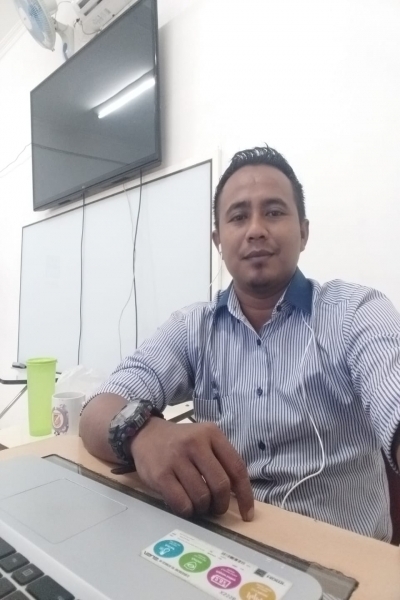Hybrid Zero Trust Container Based Model for Proactive Service Continuity under Intelligent DDoS Attacks in Cloud Environment
(Danang Danang, Eko Siswanto, Nuris Dwi Setiawan)
DOI : 10.62951/ijcts.v2i3.291
- Volume: 2,
Issue: 3,
Sitasi : 0 30-Jul-2025
| Abstrak
| PDF File
| Resource
| Last.13-Aug-2025
Abstrak:
Growth rapid computing cloud, especially on academic, government, and service platforms. public, has trigger improvement frequency and complexity Distributed Denial of Service (DDoS) attacks. Intelligent DDoS attacks AI based capable copy pattern Then cross user valid, so that difficult detected and mitigated. The majority approach mitigation moment This nature reactive, no scalable, and tends to sacrifice availability service for authorized users. Research This aiming develop architecture proactive and adaptive defense For ensure continuity service during attack ongoing. Security model proposed hybrid integrating Zero Trust Architecture (ZTA), adaptive bandwidth control, and isolation service container -based. Architecture consists of from three layer Main: (1) ZTA Policy Engine which performs verification identity and assessment behavior through tokens and policies intelligent; (2) Adaptive Bandwidth Load Balancer which automatically dynamic separate and arrange Then cross based on reputation and level trust ; and (3) Containerized Service Cluster which groups request to in different containers For user trusted and not known . Components addition such as blockchain -based smart contracts are used For recording request and verification access , as well as lightweight AI module used for profiling then cross in real-time. Simulation results show that this model succeed increase availability service for user trusted during attack , press false positive rate , as well as optimize allocation source power. Integration of zero trust policies with intelligence Then cross and segmentation service in real-time forming framework effective and scalable defense to modern DDoS threats . In conclusion , the study This contributes a robust , adaptive , and modular architectural model for maintain continuity cloud services in condition network at risk .
|
0 |
2025 |
Systematic Literature Review on CNN and YOLO Algorithms for Detecting Plant Diseases in Precision Agriculture
(Dani Sasmoko, Eko Siswanto, Febryantahanuji Febryantahanuji)
DOI : 10.70062/slrj.v1i1.50
- Volume: 1,
Issue: 1,
Sitasi : 0 30-Jan-2025
| Abstrak
| PDF File
| Resource
| Last.06-Aug-2025
Abstrak:
Computer vision-based algorithms, especially Convolutional Neural Networks (CNN) and You Only Look Once (YOLO), have become the leading approaches in plant disease detection. CNN excels in extracting complex visual features for disease classification, while YOLO provides high-efficiency real-time object detection capabilities. Both algorithms have shown promising results in various studies, especially with controlled datasets. However, challenges remain in their application in real-world conditions, such as environmental diversity, overlapping symptoms, and poorly annotated data. Future research has the potential to optimize these algorithms through the development of lighter models, the use of transfer learning techniques, and multi-modal data integration. In addition, further exploration of a wider range of diseases, crops, and environmental conditions can expand the application of these algorithms. By leveraging these innovations, computer vision-based plant disease management can be improved to support sustainable precision agriculture.
|
0 |
2025 |
Simulation Of An Automatic Fish Netting Tool With Continuous Servo Motor Drive, Hc-Sr04 Distance Sensor And Button, Using Arduino Mega
(Muhammad Akmal Mulyono, Eko Siswanto)
DOI : 10.51903/jtie.v2i1.172
- Volume: 2,
Issue: 1,
Sitasi : 0 14-May-2024
| Abstrak
| PDF File
| Resource
| Last.23-Jul-2025
Abstrak:
The current fish harvesting system is still not optimal and requires a lot of human power . In every fish farming place, we can see that the fish netting system still uses manual nets, lots of people, and takes a long time. This affects the turnover / income and profit from the fish empowerment business. Therefore, to increase time efficiency, human energy, turnover and profit, this tool is a solution for every fish empowerment location. Because this tool is designed with an automatic system with a continuous servo motor, HC-SR04 distance sensor, push button, with an Arduino Mega base. button as the input command, the empowerer only needs to input the button (push button) to start harvesting cultivated fish, so that this work becomes more efficient in time, human energy, and influences the increase in turnover and business profits.
|
0 |
2024 |
Perancangan Alat Pengendali Pompa Air Berbasis IOT
(Nur Fauziah, Nuris Dwi Setiawan, Danang Danang, Eko Siswanto )
DOI : 10.61132/jupiter.v1i6.171
- Volume: 1,
Issue: 6,
Sitasi : 0 23-Nov-2023
| Abstrak
| PDF File
| Resource
| Last.06-Aug-2025
Abstrak:
Of course, a soccer field needs water and the fertility of the field soil so that the grass can grow. The development of science and technology currently has a big influence on getting work done. A pump is a tool used to move liquids (fluids) from one place to another through pipes (channels) by adding energy to the fluid being moved and continuing continuously. Currently, many water pumps still use the manual method, namely using a switch or even just using a plug. Grass will also live if the soil has appropriate humidity, if the soil moisture level is low, the grass will die if there is excess moisture and it will not be able to grow. This problem certainly requires a solution that can help monitor soil moisture as well as control water pumps. By utilizing NodeMCU ESP8266 microcontroller technology as the control center, the YL-69 sensor measures soil moisture values ??and also relays as a replacement for manual switches. To control pump conditions via Blynk.
|
0 |
2023 |
IMPLEMENTASI VARIABLE COSTING METHOD PADA SISTEM INFORMASI AKUNTANSI PENENTUAN HPP PADA UMKM KERIPIK TEMPE DESA LEBO
(Munifah, Ahmad Ashifuddin Aqham, Eko Siswanto, Indah Dwi Astutik)
DOI : 10.51903/kompak.v16i1.900
- Volume: 16,
Issue: 1,
Sitasi : 0 01-Jul-2023
| Abstrak
| PDF File
| Resource
| Last.23-Jul-2025
Abstrak:
Cost of goods manufactured (COGM) is an important component of making a product, because knowing the COGM of a product can be used as a reference to determine the profit margin of a product. Without knowing the COGM of a product, we will be confused in determining the selling price. The COGM calculation is very influential for the sale of a product whether the product is experiencing a profit or loss.
This study aims to determine the COGM calculations that have been carried out by MSMEs are in accordance with COGM accounting calculations or are still only limited to manual calculations. In addition, the main objective of this study is to design an accounting system for determining COGM in the Tempe Chips Industry in determining the cost of production and to apply a variable costing method to determine the cost of goods manufactured in SMEs so that the correct cost of production can be presented.
The results of this study indicate that based on Cost of goods manufactured calculations carried out by MSME actors it is still very low so it is necessary to revamp the HPP calculations in accordance with accounting standards. Based on the evaluation of the old system, the author wishes to offer a new system, namely the Information System for Determining the Cost of Production of Tempe Chips SMEs which is expected to be an alternative in solving problems that are being faced by business owners. This new system makes it easy for users related to the process of recording data into the database, so that related parties can easily operate.
|
0 |
2023 |
SISTEM INFORMASI PENGELOLAAN DAN ANALISA PERSEDIAAN BARANG METODE RASIO BERBASIS WEB
(Sri Wahyuning Wahyuning, Anif Maghfiroh, Haryo Kusumo, Eko Siswanto)
DOI : 10.51903/kompak.v16i1.1111
- Volume: 16,
Issue: 1,
Sitasi : 0 23-Jun-2023
| Abstrak
| PDF File
| Resource
| Last.23-Jul-2025
Abstrak:
Financial management is an administrative activity related to budget planning, storing, using, recording and monitoring the entry and exit of money or organizational funds.
Inventory analysis is an activity to examine an asset issue that includes goods. Turn over inventory is the ratio between the total cost of goods sold and the average value of inventory owned by the company. in the process of managing finances and inventories, it is still carried out using a recording system in a ledger, so it is less effective. Therefore the author will develop a form of information system by selecting CV. Arris AC as research object.
Based on the problems that occur in CV. Arris AC, the authors provide a solution that can overcome weaknesses by creating an Accounting Information System for Financial Management and Inventory Analysis using the inventory turnover ratio method which can be accessed via the web.
In other words, this ratio describes how fast inventory rotates.
web is an application that contains multimedia documents (text, images, sound, animation, video) in it that uses the HTTP protocol with database support for MySQL, Xampp and Adobe Dreamweaver CS6..
Keywords:Accounting, Financial Management,
Inventory Analysis, Ratio, Web
|
0 |
2023 |
Sistem Informasi Pengelolaan Keuangan Dana Desa Dengan Metode Accrual Basic Pada Kelurahan Kutoharjo Kecamatan Kaliwungu
(Sukemi Kamto Sudibyo, Ana Safitri, Eko Siswanto)
DOI : 10.51903/juisi.v2i2.590
- Volume: 2,
Issue: 2,
Sitasi : 0 16-Jun-2023
| Abstrak
| PDF File
| Resource
| Last.23-Jul-2025
Abstrak:
Every government agency or company must have a different financial plan, currently all government agencies or companies are required to make reports relating to their financial developments. This information is compiled and presented by the village government in the form of balance sheets, journal reports, because financial reports are a form of accountability from the Village Head or the Village Treasurer. one by one.
The results of this study are to make it easier for the Kutoharjo Village Office in the process of financial management, assisting in the process of inputting financial data on an accual basis when giving or receiving cash, before a cash transaction occurs which acknowledges the effect of the transaction regardless of when cash is received or paid, data search, and village fund financial reports by optimizing data security.
|
0 |
2023 |
Deteksi Malware Statis Menggunakan Deep Neural Networks Pada Portable Executable
(Dieta Wahyu Asry, Eko Siswanto, Dendy Kurniawan, Haris Ihsanil Huda)
DOI : 10.51903/teknik.v3i1.325
- Volume: 3,
Issue: 1,
Sitasi : 0 09-May-2023
| Abstrak
| PDF File
| Resource
| Last.23-Jul-2025
Abstrak:
Latar Belakang: Dua komponen utama pada analisismalware adalah analisis malware statis yang melibatkan pemeriksaan struktur dasar malware yang dapat dieksekusi tanpa mengeksekusinya sedangkan analisis malware dinamis bergantung pada pemeriksaan perilaku malware setelah menjalankannya di lingkungan yang terkendali. Analisis malware statis biasanya dilakukan oleh perangkat lunak anti-malware modern dengan menggunakan analisis berbasis tanda tangan atau analisis berbasis heuristik. Tujuan Utama: Tujuan dari penelitian ini adalah megusulkan dan mengevaluasi deep neural network untuk menganalisis file portabel secara statis guna mempelajari fitur-fitur dari portable executable malware untuk meminimalkan terjadinya false positive saat mengenali malware baru. Metode penelitian: Model yang diusulkan dalam penelitian ini adalah model Neural Network with Dropout terhadap model pohon keputusan untuk memeriksa seberapa baik kinerjanya dalam mendeteksi file PE berbahaya yang sebenarnya. Metode format-agnostik digunakan untuk mengekstrak fitur dari file. Dataset digunakan untuk melatih model yang diusulkan dan membandingkan hasil dengan dataset malware lain yang diketahui. hasil: Hasil dari penelitian ini menunjukkan bahwa penggunaan jaringan saraf dalam yang sederhana untuk mempelajari fitur PE vektor tidak hanya efektif, tetapi juga kurang intensif sumber daya dibandingkan dengan metode deteksi heuristik konvensional. kesimpulan: Model yang diusulkan dalma penelitian ini mencapai AUC sebesar 99,8% dengan 98% true positive pada 1% false positive pada kurva ROC. Untuk menunjukkan bahwa model ini berpotensi melengkapi atau menggantikan perangkat lunak anti-malware konvensional maka untuk penelitian dimasa depan diusulkan untuk mengimplementasikan model ini secara praktis
|
0 |
2023 |
APPLICATION FOR DIAGNOSTIC DENTAL AND MOUTH DISEASE USING FORWARD CHAINING METHOD
(Eko Siswanto, Ahmad Ashifuddin Aqham, Toni Wijanarko Adi Putra)
DOI : 10.51903/jtikp.v13i2.334
- Volume: 13,
Issue: 2,
Sitasi : 0 01-Sep-2022
| Abstrak
| PDF File
| Resource
| Last.23-Jul-2025
Abstrak:
The mouth is the entrance to the digestive system and contains accessory organs that are in the early stages of digestion, while teeth are made of a very hard material, namely dentin. (Indah Irma & Ayu Intan, 2013. Many people complain of pain in the teeth and mouth due to lack of hygiene in maintaining the health of this organ. So when people are attacked by dental and oral diseases, people try to do their own treatment, for example buying toothache medicine in the shop. According to Turban (in Vincent, 2011) an expert system is a system that uses human knowledge where this knowledge is entered into a computer and then used to solve problems that usually require human expertise or expertise. The method used is the forward chaining method, namely forward chaining starting from a set of facts (there are) by looking for rules that match the assumptions/hypotheses that exist towards conclusions (Siswanto 2010).
|
0 |
2022 |
DEEP LEARNING ALGORITHM FOR CONNECTING SCIENTIFIC RECORDS AND SOCIAL PLATFORM
(Budi Santoso, Agustinus Budi Santoso, Eko Siswanto)
DOI : 10.55606/jeei.v2i3.913
- Volume: 2,
Issue: 2,
Sitasi : 0 22-Jun-2022
| Abstrak
| PDF File
| Resource
| Last.19-Aug-2025
Abstrak:
In the healthcare industry, professionals develop big amounts of disorganized data. The complexity of this data and the loss of computational capability lead to delays in the investigation. Nevertheless, with the advent of Deep Learning algorithms and connection to computing power such as Graphic Processor Units (GPUs) and Tensor Processing Units (TPUs), text and image processing has become usable. Deep Learning (DL) data bring about a big outcome in Natural Language Processing (NLP) and computer perception. The main purpose of this study is to build an undivided approach that can relate social platforms, literature, and scientific records to develop an approach to medicinal education for the public and experts.
This study focuses on NLP in the healthcare industry and compiles data by Electronic Medical Records (EMR), medical literature, and social platforms. The framework proposed in this study is one for connecting social platforms, medical literature, and Electronic Medical Records scientific records using Deep Learning algorithms. Linking data sources requires defining the relationships between them, and finding concepts in medical texts. The National Library of Medicine (NLM) introduced the Unified Medical Language System (UMLS) and uses this system as the basis for the proposed system. The dynamic nature of a social platform can be recognized and supervised methodologies can be applied under supervision to develop conception. Named entity Recognition (NER) enables the active eradication of data or individuals by the pharmaceutical literature.
|
0 |
2022 |






